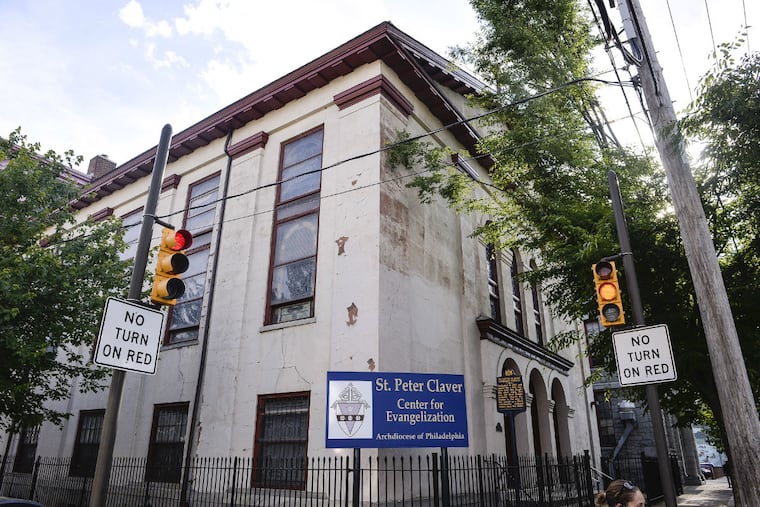St. Peter Claver, Philadelphia’s mother church for Black Catholics, will close for good in January
The Archdiocese of Philadelphia announced the closure of St. Peter Claver, along with three other churches, on Sunday.

A long, emotional fight to protect Philadelphia’s mother church for Black Catholics is coming to its end. On Sunday, the Archdiocese of Philadelphia announced that St. Peter Claver, the city’s first Black Catholic church, will finally close Jan. 23.
The church was originally dedicated in 1892 and has been a bedrock institution for Philly’s Black Catholic community. It is one of four churches that the archdiocese plans to close next month — the others are Sacred Heart Church in Phoenixville, St. Philip Neri Church in East Greenville, and Holy Trinity Church in Old City.
“In a lot of ways, it’s probably just as important as Mother Bethel A.M.E., because this is the first place that Black Catholics had of their own in the archdiocese and in a city that prides itself on its Catholic heritage,” said Anthea Butler, professor and chair of religious studies at the University of Pennsylvania.
But despite the church’s historical significance, Black Catholics in Philly have felt for a long time that the archdiocese did not adequately support it. They say this conclusion felt inevitable.
St. Peter Claver sits at what used to be the heart of Black Philadelphia at 12th and Lombard Streets. Even aside from its role in a religious sense, the church was a safe, communal gathering space for generations of Philadelphians. “Some of the older people would come in there ... some of them would take their shoes off and say, ‘I’m walking on this sacred ground. Because this is where my ancestors came through,’” said Arlene Edmonds, a Black Catholic journalist and author.
Beginning in the mid-20th century, as white flight, urban renewal, and gentrification moved Black Philadelphians to North Philly and West Philly, it became harder for St. Peter Claver to fill its pews. In 1984, the archdiocese closed the church’s parish, and then, a year later, the church was officially “suppressed” by the archdiocese. Together, those actions meant that St. Peter Claver could no longer hold regular Mass or accept new parishioners. It could no longer perform sacraments, like baptisms, marriages, or funerals.
“What it does is strangle a church,” said Adrienne Harris, a third-generation member of St. Peter Claver and the chairperson of the St. Peter Claver archives, in a video made by former parishioners about the church. “That was the archdiocese’s method of strangling the life out of St. Peter Claver.”
The church converted itself to the St. Peter Claver Center for Evangelization in 1986, allowing it to hold special events, a monthly Mass, and serve as a historical monument, while also housing the archdiocesan Office for Black Catholics. But in 2014, the archdiocese announced its formal closure, even though several legal barriers remained before it could be sold. Since then, it has remained mostly as a historical monument, awaiting its eventual sale.
“The decision to close the [St. Peter Claver] was made at that time in response to demographic shifts. ... As the Black Catholic community spread to many areas of the archdiocese, [St. Peter Claver] became utilized by fewer and fewer people over the years,” said Kenneth A. Gavin, a spokesperson for the archdiocese.
“To be selling this historic church is disheartening, but it’s also indicative of what’s been going on with the archdiocese here for a long time,” Butler said, referencing other sales that the archdiocese has made in recent years to pay for pension obligations and the millions of dollars in payments to clergysexual abuse victims. Given St. Peter Claver’s prime Center City location, the property should fetch a high price.
“I think the history of Catholicism in Philadelphia is being systematically destroyed by the archdiocese, because they can’t pay for the buildings. And they have not proven in any kind of way that they care about this history,” Butler said.
Former parishioners and other members of Philly’s Black Catholic community have fought to save the church over the years but have felt ground down by the archdiocese’s insistence on a sale. “I think a lot of people just tired of fighting,” Edmonds said.
“The Archdiocese of Philadelphia has a duty to act as a prudent steward of the resources entrusted to its care,” Gavin said. “The former Saint Peter Claver Church building has been sitting vacant as an unutilized [sic] asset for some time. The recent decree and a potential future real estate transaction will allow for greater support of ministry to the Black Catholic community in the archdiocese.”
As part of a ruling in the Orphans’ Court Division of the Court of Common Pleas in 2017, the archdiocese must designate a third of the proceeds from the sale to benefit the Black Catholic community. But even with legal backing, community members have a hard time believing that they will experience meaningful benefits from those proceeds.
“The exact use of the funds that will be designated for support of ministry to the Black Catholic community has not yet been determined. Several factors will go into the decision making process such as the amount of funds realized and the priority needs to best serve that community,” Gavin said.
“I think people are very skeptical now,” Edmonds said.
Butler said that this sale is indicative of a wider trend from the archdiocese, where it has become “administrators rather than shepherds“ of Catholicism in Philadelphia.
And she believes that when caretaking of history and emotion is deprioritized, Black people tend to be the ones who experience it first.
“I don’t see that this archdiocese really cares about Black Catholics.”
Correction: An earlier version of this article incorrectly reported the date of the archdiocesan announcement as Monday; the announcement was made on Sunday, Dec. 11.